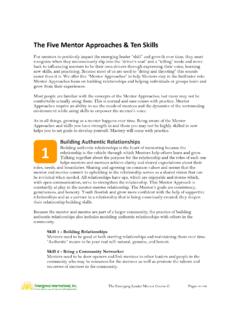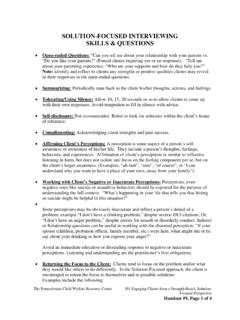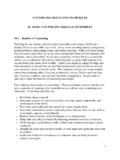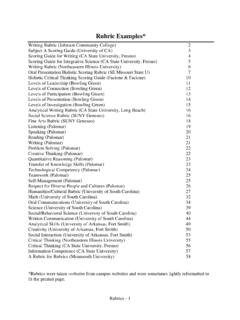Transcription of Traits and Skills Theories as the Nexus between Leadership ...
1 Traits and Skills Theories as the Nexus between Leadership and Expertise: Reality or Fallacy? Marie-Line Germain St. Thomas University The assumption that effective leaders differ in some identifiable and fundamental ways from other people is still a large part of mainstream I/O psychology. Based on a research review on the trait theory of Leadership and what is known about the concept of expertise, this paper attempts to find a convergence between leader and expert Traits . Results suggest that leaders and experts may share similar characteristics. However, the concept of expertise also encompasses Skills theory. Keywords: Expertise, Leadership , Personality The complex phenomenon of Leadership is a topic with universal appeal. Over the decades, it has been defined by I/O psychologists and others who study it in a number of ways.
2 The component common to almost all definitions is that Leadership is an influence process that assists groups of individuals towards goal attainment (Northouse, 2007, p. 12). Similarly, the definition of expertise has been the object of much debate. For the purpose of this paper, Swanson and Holton's (2001) definition is a good fit: expertise is the combination of experience, problem-solving Skills , and knowledge. To that definition, Germain (2006) adds a self-enhancement factor, which includes attributes such as extraversion, self-assurance, or charisma. For nearly half a century, the popularity of Leadership and expertise has been rising in organizations as well as in research. Both topics have been the object of a multitude of academic research articles and books chapters nationally and internationally (Bass, 1990; Germain, Vecchio, Schriesheim, Martinko, & Van Fleet, 2004).
3 Research centers have been built and training programs have been designed to improve employees' Leadership Skills and to increase their level of expertise. While the expertise and the Leadership concepts have seldom been the object of comparison and contrast in the human resource development (HRD) and in the management research literature, a closer look at their respective human characteristics may help us better understand human dynamics in organizations. The purpose of this paper is to investigate the extent to which expert and leader characteristics converge, if at all. In order to accomplish that goal, a review of key research journal articles and books on the topics of Leadership trait theory and expertise was performed, the result of which is presented in this paper.
4 Theoretical Framework Theories of Leadership The discussion of whether Leadership is a behavior, a trait, or a skill has been ongoing. It began with an emphasis on identifying the qualities of great persons. Leadership Skills were once thought to be a matter of birth: leaders were born, not made (Kirkpatrick & Locke, 1996; Cawthon, 1996). One had to be of the right breed to lead;. all others had to be led. No matter the amount of yearning or learning, one's destiny could not change. Next, research shifted to include the impact of situations on Leadership . Recently, it has shifted back to reemphasize the critical role of Traits in effective Leadership (Bryman, 1992; Lord, DeVader, & Alliger, 1986). Today, the trait approach of Leadership is alive and well. In 1991, Kirkpatrick and Locke asserted that it is unequivocally clear that leaders are not like other people (p.)
5 59). They further postulated that leaders differ from non-leaders on six Traits : drive, the desire to lead, honesty and integrity, self-confidence, cognitive ability, and knowledge of the business. Even more recently, Judge, Bono, Ilies, and Gerhardt (2002) found a strong relationship between Goldberg's (1990). Big-Five Traits and Leadership , extraversion being the trait the most associated with it. Unequivocally, decades of research show that having certain personality Traits is associated with being an effective leader. Focus on Expertise From a set of humble beginnings some fifty years ago, the construct of expertise was propelled as a research topic when the fields of computer science and cognitive psychology began exploring artificial intelligence and human expertise development in the mid- to late sixties.
6 As interest in expertise grew, other areas such as education and medicine began to develop Theories about knowledge acquisiting and expert development. On the other hand, Copyright 2008 Marie-Line Germain 10-1. little empirical attention has been directed to the construct despite a half-century of work on the topic. This absence of empirical evidence may be the main reason of the gradual development of understanding of expertise in the last three decades (cf. B dard & Chi, 1992). The past 15 years, however, have seen an upsurge in the pace of expertise research, as evidenced in the growing number of peer-reviewed publications in the area (Swanson & Holton, 2001). Indeed, today the development of employee expertise has been described as a strategic imperative for ever-changing organizations in a hyper competitive economic environment.
7 Torraco and Swanson (1995) further assert that business success increasingly hinges on an organization's ability to use its employees' expertise as a factor in the shaping of its business strategy (p. 11). Although there are no distinct Theories of expertise, HRD practitioners and researchers agree that this human-related construct affects many organizational outcomes. Traits Theory and Leadership The trait approach of Leadership has a century of research to back it up. No other theory can boast of the breadth and depth of studies conducted on it (Northouse, 2007; Hunt, 1991). The strength and longevity of this line of research give the trait approach a measure of credibility that other approaches lack. Out of this abundance of research has emerged a body of data that points to the important role of various personality Traits in the Leadership process.
8 The trait approach focuses exclusively on the leader, not on the followers or the situation. This makes the trait approach theoretically more straightforward than other approaches such as situational Leadership or leader- member exchange (LMX) theory. In essence, the trait approach is concerned with what Traits exhibit and who has those Traits . It does not lay out a set of hypotheses or principles about what kind of leader is needed in a certain situation or what a leader should do, given a particular set of circumstances. Rather, this approach emphasizes that having a leader with a certain set of Traits is crucial to having effective Leadership . It is the leader and her or his personality that are central to the Leadership process. Traits Theory and Expertise Since the construct of expertise may include personality Traits (Germain, 2006), it is appropriate to question whether experts could, like leaders, be born.
9 Just as the "great man" Leadership theory (Kirkpatrick & Locke, 1996). was an inadequate definition of Leadership , it is possible that it would also be inadequate for expertise. However, because there has been a revival of the Great Man theory in the Leadership literature, it is legitimate to inquire about its applicability to the concept of expertise. Multiple studies have shown that Traits and Skills were attributes of expertise. For instance, self-confidence was identified by Smith and Strahan (2004) as a tendency in effective teaching and in expert teachers in general. Personality and social Skills were identified as characteristics of expert college instructors (Germain, 2006). In 1993, B dard, Chi, Graham, and Shanteau made personality Traits one of their five conditions of expertise along with knowledge, cognitive Skills , task characteristics, and decision strategies.
10 Additionally, Tiberius, Smith, and Waisman (1998) believed that expertise was based on knowledge, Skills , and talent. Weiss and Shanteau (2003) further asserted that it is the behavior that is or is not expert. Finally, in a comprehensive empirical study on expertise, Germain (2006) found that experts were perceived by subordinates as having evidence based and self-enhancement based characteristics. Evidence based items include knowledge, education, qualification, and training (Table 1). Self-enhancement items include subjective attributes such as ambition, drive, the ability to improve, to deduce, to assess, intuition, judgment, self-assurance, self-confidence, extraversion, and charisma (Table 2). Table 1. Evidence-Based Expertise Items: Theories and Components Evidence Based Items Theories Component - Definition of expertise (Swanson & Holton, 2001).















